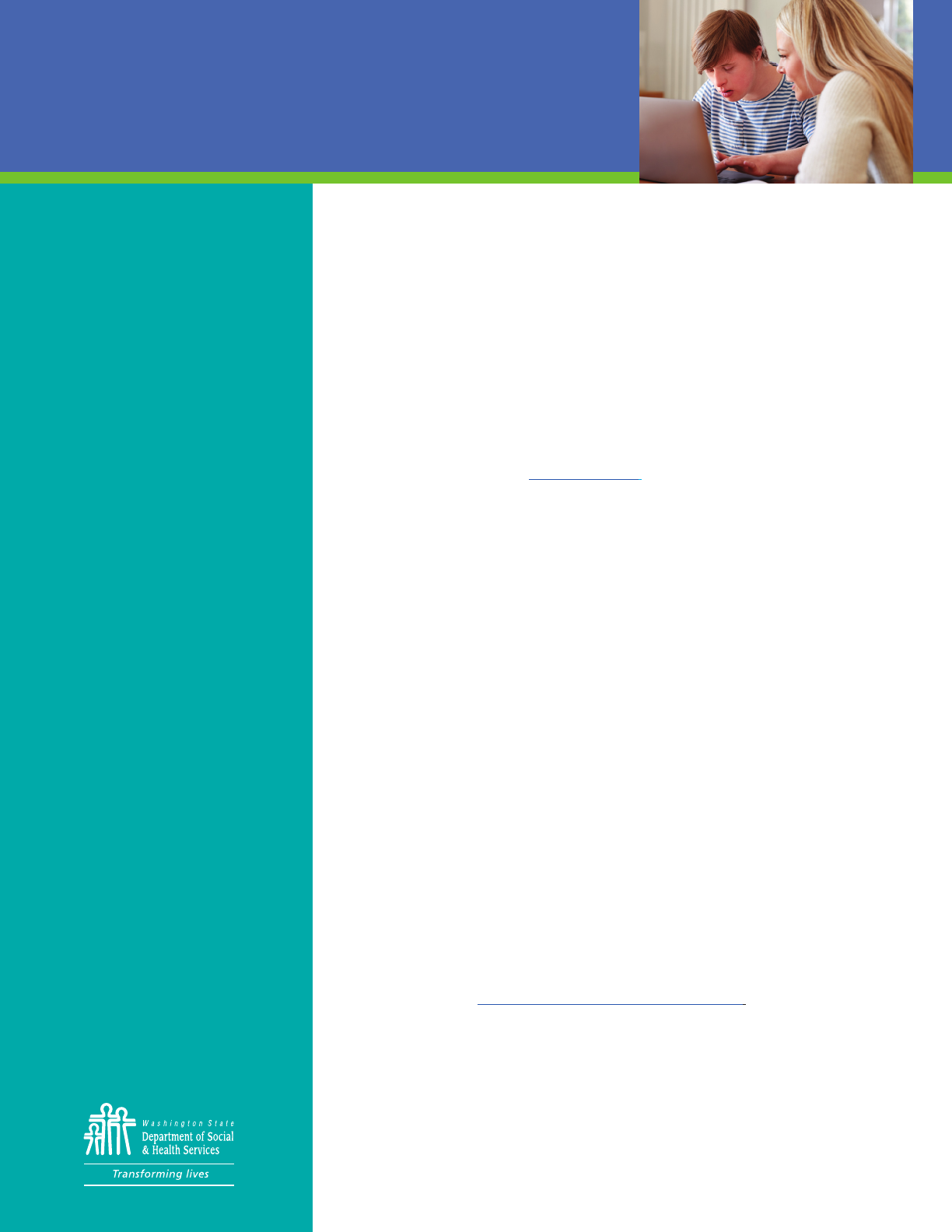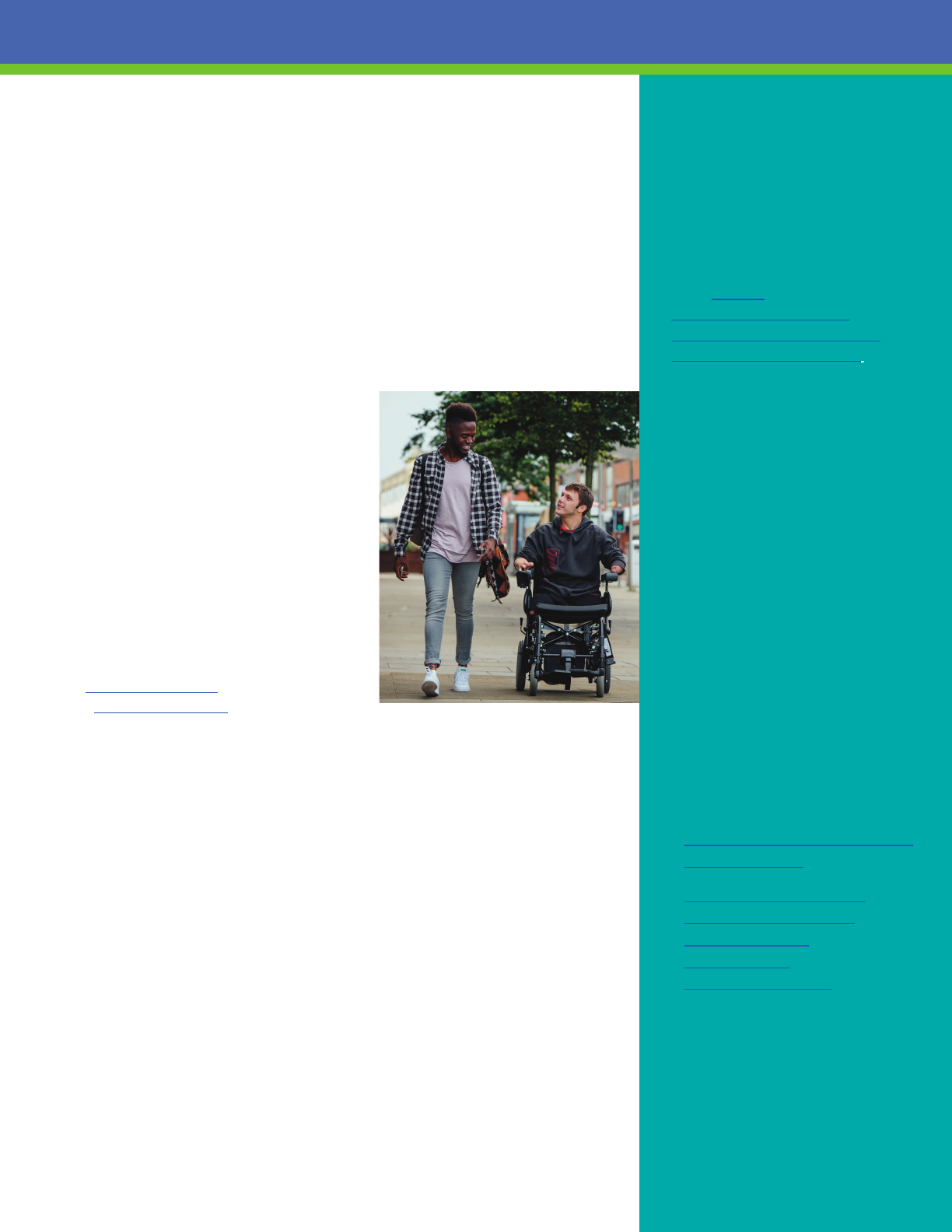
D I D YO U K N O W ?
Community Engagement
Learning about services
EXT ERNAL
CONTINUED ON NEXT PAGE
What are some examples
of this service?
• Get connected to your
community through classes.
You could learn cooking,
pottery, dance, sign language,
exercise, yoga and more.
•
• Connect with people in your
community who share similar
interests. A Community
Engagement provider can help
you get connected with others
who enjoy art, music, games, or
sports.
•
• Pursue community goals such
as volunteering.
• Community Engagement can
help you reach goals. Learning
about managing finances and
meeting new people can help
increase independence
Did you know that Community Engagement can help you
get connected?
Community Engagement services are designed to increase your access to
the community and build connections to community networks. This service
is designed to increase access to community resources and relationships in
creative ways.
Where is Community Engagement delivered?
Any setting you choose that supports full access of individuals with
intellectual and developmental disabilities to the greater community. More
information is available in DDA Policy 4.14.
Who can receive this service?
People enrolled in the Individual and Family Services Waiver, Basic Plus Waiver,
Core Waiver (when not receiving residential habilitation services), the Roads to
Community Living grant, or the Preadmission Screening and Resident Review
program.
How do I get this service?
Contact your case resource manager, talk to them about your goals for
getting out in the community. Your CRM will add the service and your
chosen provider to your person-centered service plan. You or your legal
representative will need to sign your updated person-centered service plan
before services start.
How many hours or dollars can I receive in the
plan year?
The approved funds available to you are determined by your program and
annual assessment.
How do I find a provider?
Your case manager can provide a list of providers in your area or use the “Find
a Provider Tool” at https://informingfamilies.org/locator/.

CONTINUED
Interested in becoming a
provider?
If you are interested in becoming
a contracted provider for a DDA
service, call your local DDA office
and ask for the contracts
department. Or go online to learn
more https://
www.dshs.wa.gov/dda/
developmental-disabilities-
administration-contracts
Everett . . . . . . . . . 425-740-6500
Seattle
. . . . . . . . . 206-568-5685
Spokane
. . . . . . . 509-329-2900
Tacoma
. . . . . . . . 253-404-5500
Tumwater
. . . . . . 360-725-4250
Yakima
. . . . . . . . . 509-225-7970
External resources:
•
•
•
https://informingfamilies.org/
ce-cg-overview/
https://fortress.wa.gov/
dshs/adsaapps/about/
factsheets/DDA/
Community%
20Engagement.pdf
What do I do when I find a provider?
Talk with the provider about your ideas, goals, needs, and available hours.
When you and the provider determine the amount of hours necessary to
work on the identified needs, let your CRM know which provider you have
chosen so they can add them to your plan. Your CRM will send a person-
centered service plan for your signature and a planned action notice. Your
signature lets your CRM know you agreed to the service and the provider.
When can my provider start?
Your CRM will let you know when the service is authorized and your provider
can start.
What should I expect from my
provider?
After the CRM authorizes services, the
provider should contact you to set up a
schedule. With your input, the provider
must complete a plan within the first 30
days. Also with your input, the provider
will need to complete a progress report
every 90 days. These documents help DDA
ensure your needs are being met, and
the service is being provided the way it is
intended.
Use DSHS Form 10-659 to develop an initial
plan. DSHS Form 10-660 may be used to
complete a progress report. Plans and progress reports do not need to use
the DSHS forms, but should include the same elements as the forms.
Who is a qualified service provider?
Qualified providers of Community Engagement services must be contracted
with DSHS to provide this service. Also, they must be an individual or
organization that has specialized training to provide services to people with
developmental disabilities. Qualified provider types include:
1) Registered recreational therapists in the state of Washington; or
2) Organizations that provide services to promote skill development,
improved functioning, increased independence, as well as reducing or
eliminating the effects of illness or disability. These include, but are not
limited to:
a) Community centers;
b) Municipal parks and recreation programs;
c) Therapeutic recreation camps and programs; and
d) Organizations that provide supports for individuals with developmental
disabilities.
